
Ever wonder if you and your partner can truly make a long-distance relationship work? You’re not alone. Studies show that around 58% of long-distance couples succeed, and most send over 300 texts and spend eight hours on calls each week. Take a look at this:
Success Factor | Percentage/Statistic |
|---|---|
Success rate | ~58% |
Trust as foundation | 85% |
Open communication | 82% |
Physical intimacy challenge | 66% |
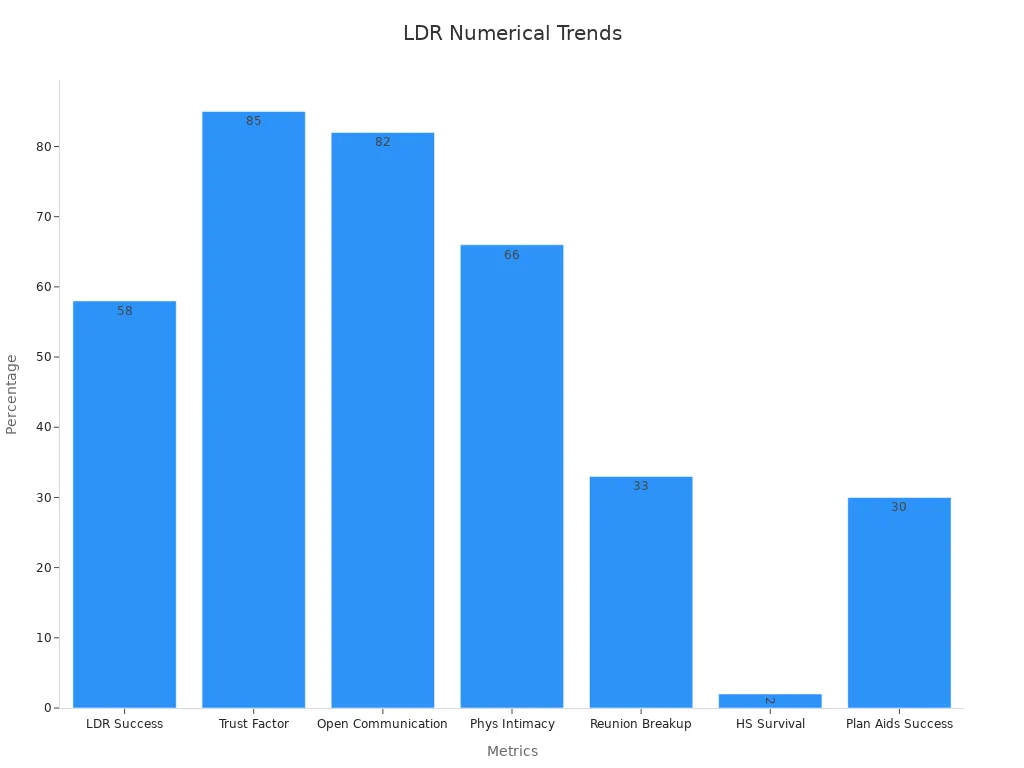
You can beat the distance with the right mindset and some smart long distance relationship tips. Let’s explore how you can build a strong, loving connection—no matter the miles.
Key Takeaways
Talk to each other often to build trust and stay close. You can text every day or have video calls.
Always tell the truth and share your feelings. This helps you fix problems and makes your bond stronger.
Plan online dates and surprise each other. This keeps your relationship fun and special.
Make clear rules and goals together. This helps you feel safe and excited about your future.
Visit each other when you can. Get help from friends, family, or a counselor to stay strong and face problems.
Communication Essentials
Staying connected is the heart of every long-distance relationship. You might feel miles apart, but strong communication can make you feel close every day. Let’s look at some smart ways to keep your bond strong.
Consistent Routines
Setting up a regular routine helps you and your partner feel secure. Try sending a good morning text or having a video call before bed. These small habits build trust and show you care. Studies show that couples who stick to daily routines, like morning messages or evening chats, feel more satisfied and connected. You don’t need to talk all day. Just make your time together count. Sharing a funny story or a quick update about your day can make a big difference. If you both know when you’ll talk next, you avoid misunderstandings and feel more valued.
Tip: Make a simple schedule together. Decide when you’ll call or text, and stick to it as much as possible.
Open Dialogue
Honest conversations keep your relationship healthy. If something bothers you, talk about it right away. Using “I” statements, like “I feel sad when we miss our calls,” helps you share your feelings without blaming your partner. Research shows that open dialogue helps couples solve problems and build trust. When you listen and respond with care, you avoid jealousy and keep your connection strong. Regular check-ins, even just to ask, “How are you feeling today?” can prevent small issues from growing.
Share your thoughts and feelings.
Don’t be afraid to ask questions.
Virtual Date Ideas
Distance doesn’t mean you can’t have fun together. Plan virtual dates to keep things exciting. You can cook the same recipe, play online games, or watch a movie at the same time. Couples who enjoy regular video date nights report feeling closer and happier. Try new things, like taking a virtual museum tour or sharing playlists. These creative ideas help you make memories, even when you’re apart. Many long distance relationship tips suggest mixing planned dates with surprise messages or calls to keep the spark alive.
Remember: It’s not about how often you talk, but how meaningful your time together feels.
Setting Expectations and Goals
Setting clear expectations and goals gives your long-distance relationship a strong foundation. You and your partner need to know where you stand and where you’re headed. This helps you both feel secure and hopeful, even when miles apart.
Realistic Boundaries
Boundaries are not about building walls. They help you and your partner understand each other’s needs and limits. When you set realistic boundaries, you avoid misunderstandings and reduce stress. Here are some ways boundaries can help:
You both agree on how often to call or text, so no one feels ignored or overwhelmed.
You talk about personal space. It’s okay to spend time with friends or enjoy hobbies on your own.
You decide together what exclusivity means for your relationship.
You discuss how long the distance will last and make plans to close it.
You stay flexible and show empathy when things change.
Research shows that couples who talk openly about boundaries and expectations feel more trust and less jealousy. When you know what to expect, you feel more confident and less anxious.
Shared Future Plans
Having a shared vision for the future keeps you motivated. You and your partner can talk about your goals, like when you’ll visit next or when you hope to live in the same city. Knowing the long-distance phase is temporary makes it easier to handle tough days. Most couples find that having a timeline, even if it changes, gives them hope and direction. Make sure you both feel heard and excited about your plans.
Tip: Write down your goals together. Check in every few months to see how things are going.
The ‘777’ Rule
The ‘777’ rule is a fun way to keep your connection strong. It means you try to see each other every seven days, weeks, or months—whatever works for your situation. This rule gives you both something to look forward to and helps you plan visits or special calls. Even if you can’t meet in person often, having a countdown to your next call or visit makes the wait feel shorter. Try it out and see how it brings you closer!
Long Distance Relationship Tips for Emotional Connection
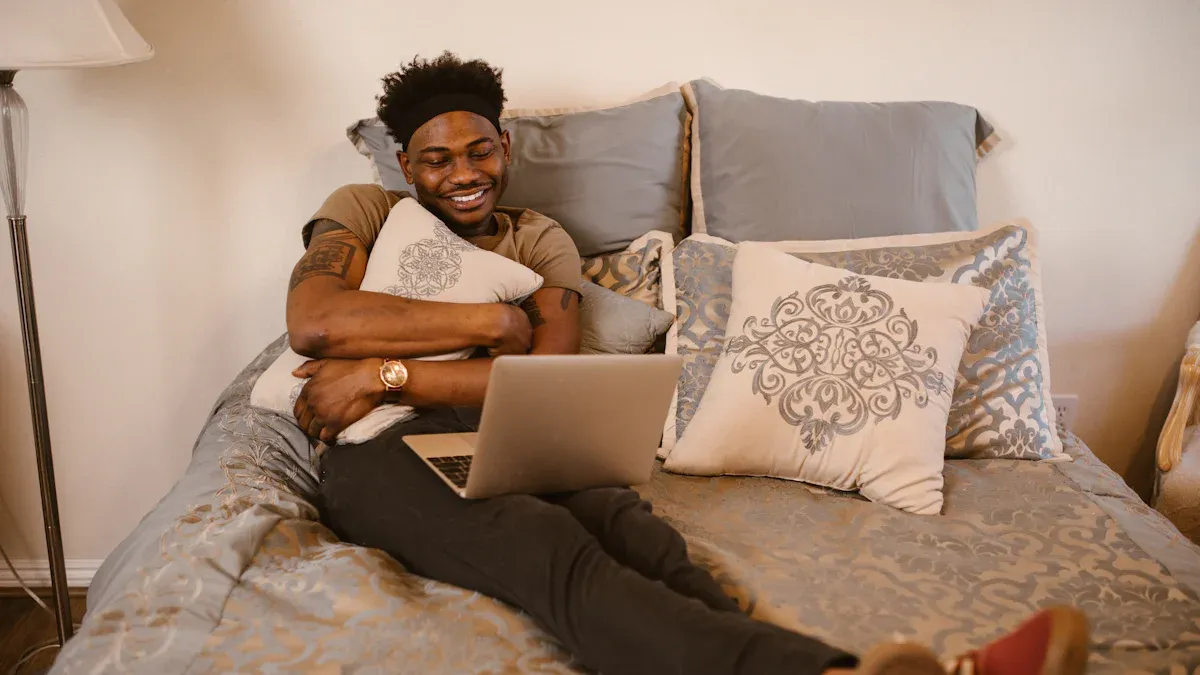
Building Trust
Trust keeps your relationship strong, even when you are apart. You can build trust by being honest and open. Try these ideas:
Share your feelings, even if they seem small.
Make choices together, like planning visits or setting goals.
Give each other space to grow and make choices.
Listen and show care when your partner shares something.
Celebrate each other’s wins, big or small.
Studies show that sharing and supporting each other helps you feel close. Trust grows slowly with patience and steady effort. When you both feel safe and valued, your bond gets stronger.
Trust-Building Action | Benefit |
|---|---|
Open communication | Builds emotional safety |
Increases engagement | |
Empathy and recognition | Deepens connection |
Consistent routines | Reduces anxiety and doubt |
Managing Loneliness
Feeling lonely is normal in long-distance relationships. About 30% of people in these relationships feel lonely. This is more than people who live close to their partner. You can handle loneliness by changing your daily habits. Try joining online groups, talking to friends, or starting a new hobby. Social skills and support help, but you need to keep doing these things. Quick fixes may help for a short time, but real change comes from making these actions a habit.
Tip: Set up regular video calls with friends or join an online club. Staying connected with others helps you feel less alone.
Supporting Growth
Long-distance relationships help you grow as a person. Many couples say distance helps them focus on their own dreams. Research shows that couples who support each other’s growth feel happier. You might have fewer arguments and more time for hobbies or work. Some couples say their talks get better and more meaningful. Remember, supporting each other’s independence makes your relationship stronger. Celebrate your partner’s achievements and encourage their dreams. This is one of the best long distance relationship tips for keeping your bond healthy and happy.
In-Person Visits and Reunions

Seeing your partner in person is very important. These visits help you feel close. They remind you why you work hard to stay together. Let’s see how you can enjoy your time together.
Planning Visits
Planning visits gives you both something to be excited about. Knowing when you will meet next makes waiting easier. Many couples say planning visits keeps them happy and close. Couples who plan visits often are 20% more likely to stay together. Here’s a quick look at how planning visits helps:
Aspect of Long-Distance Relationships | Percentage/Data |
|---|---|
Long-distance relationships that eventually become geographically close | 75% |
Couples who remain together after closing the distance | 70% |
Couples who say distance made their relationship stronger | 55% |
Average duration before reuniting physically | 14 months |
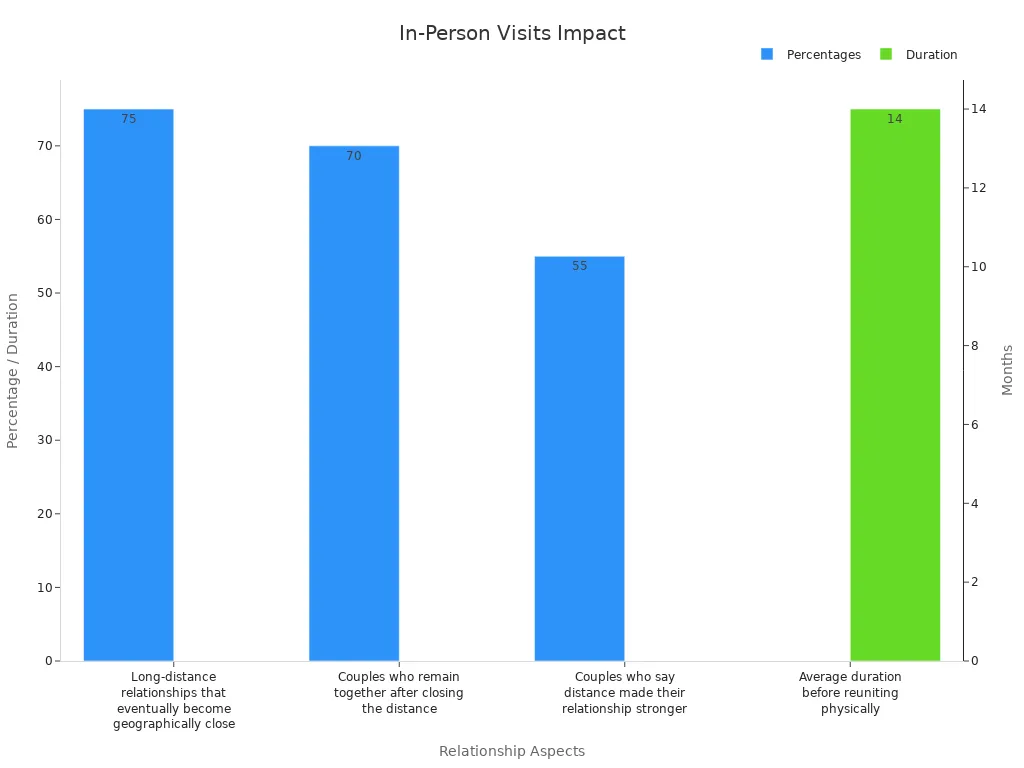
Try to take turns visiting each other if you can. Talk about what you both want to do during visits. Do you want to relax, go out, or just spend quiet time? Making a plan helps you both feel happy.
Tip: Before each visit, talk about what you hope for. Share any worries so you both know what to expect.
Making Memories
Every visit is a chance to make memories. You do not need big plans. Cooking together or taking a walk can be special. Mix fun trips with simple moments. Take photos, write notes, or keep a journal together. These memories help you feel close when you are apart.
Try new things together.
Celebrate small wins, like making it through another month.
Keep souvenirs from your visits, like movie tickets or postcards.
Closing the Distance
Most couples want to live in the same place one day. Having a plan to close the distance keeps you both hopeful. Talk about your future together. When do you want to move closer? What steps do you need to take? Couples who make a timeline feel more hopeful and less stressed. Each visit brings you closer to your goal.
If you want more long distance relationship tips, remember to plan, talk, and stay hopeful.
Support Systems and Professional Help
Social Circles
You do not have to handle long distance by yourself. Friends, family, and other couples can help you. Staying close to your social circle makes you feel less lonely. It also helps you feel more sure about your relationship. Here are some ways your network can help:
Social media and messaging apps help you share moments. You can also get advice from people who care.
Friends may see things you do not notice. They can give honest feedback about your relationship.
When you introduce your partner to friends and family, your bond gets stronger. It also shows you are serious.
Talking with friends or joining online groups can make you feel better. It helps you get through hard days.
Studies show people with strong social ties feel happier. They also feel more supported, even when far from their partner.
Tip: Ask your friends or family for help when you need support or someone to listen.
Couples Counseling
Sometimes you and your partner need extra help. Couples counseling can help, even if you live far apart. Many therapists offer online sessions. This means you both can join from anywhere. Counseling helps you:
Talk better and solve problems together.
Learn how to set healthy boundaries. You can also talk about hard topics.
Find new ways to stay close, like sharing hobbies or making plans.
Deal with big changes, like moving closer or trust issues.
Therapists who know about long distance relationships understand your challenges. They can help you grow as a couple and as people. Even if only one of you goes, you can still learn ways to make your relationship better.
Balancing Life
Keeping your life balanced is important for your relationship. When you take care of yourself, you help your partner too. Studies show couples who balance their needs with their relationship feel happier. They also feel more sure about their future. Look at these results:
Outcome Measure | Effect Size (Cohen’s d) | Statistical Significance | Notes |
|---|---|---|---|
Relationship Satisfaction | p < .001 | Big improvement for couples | |
Relationship Confidence | 0.47 | p < .001 | Couples felt more sure about their future |
Negative Relationship Quality | 0.57 | p < .001 | Fewer problems and arguments |
Individual Functioning | 0.18–0.94 | Significant | Better mood, health, and work life |
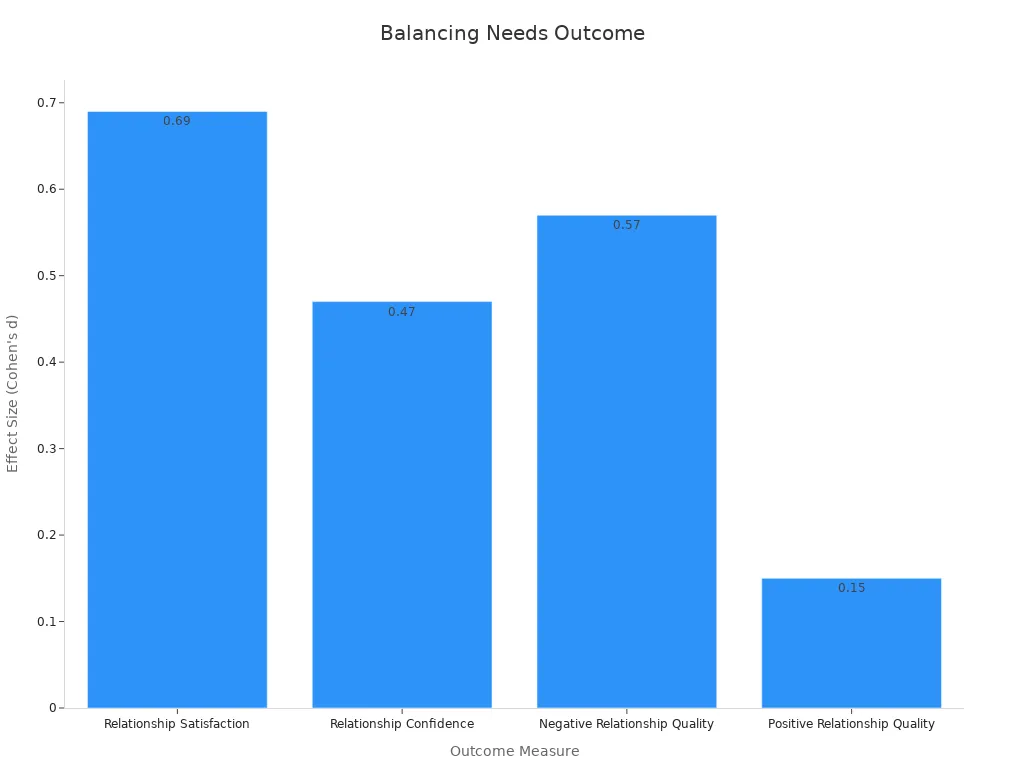
Try to spend time on your hobbies. See your friends and take care of your health. When you feel good about yourself, your relationship gets stronger too.
Conflict and Intimacy
Healthy Conflict Resolution
All couples have disagreements, even if they live far away. How you solve problems can make your relationship better. Try these steps to fix issues in a good way:
Stay calm and let your partner talk first.
Talk about the problem, not about each other.
Use “I feel” to say how you feel.
Work together to find answers and be ready to give a little.
Don’t blame or bring up old fights.
Being mindful helps you stay patient and open. When you both listen with care, you learn what each other wants and fears. Experts say couples who talk honestly and solve problems together feel happier and closer. If you both try to win together, you build trust and feel less stress. It’s okay to take a break if you get upset. You can come back to talk later.
Tip: Have regular “relationship check-ups” to talk about how things are going. Fix small problems before they get big.
Emotional Intimacy
Being far apart can be hard, but you can still feel close. Emotional intimacy means sharing your real thoughts and feelings. You can do this by:
Telling each other your dreams, worries, and stories.
Making small habits, like saying goodnight every night.
Many couples say these things help them feel close, even when they are far away. Some partners cook together on video or watch movies at the same time. These moments help you trust each other and keep your bond strong. Experts say emotional intimacy helps you get through hard times and keeps your relationship fun.
Recognizing Red Flags
Sometimes, being apart can hide problems. Watch for signs that your relationship needs help:
Red Flag | What It Looks Like |
|---|---|
Lack of communication | Long times with no talking |
Avoiding tough topics | Not sharing feelings |
Jealousy or distrust | Always checking or blaming |
No future plans | Not talking about visits or goals |
Feeling unhappy often | More sad days than happy ones |
If you see these signs, talk to your partner or ask for help. Good relationships need trust, effort, and honesty from both people.
You can make your relationship work, even if you live far away. Lots of people succeed by using long distance relationship tips. Honest talks, regular routines, and planning visits help a lot. Studies say effort, trust, and respect keep couples strong. Some couples have problems, but you can get through them with patience and new ideas. Try these tips, stay open, and remember: “Distance means so little when someone means so much.” 💌
FAQ
How often should you talk in a long-distance relationship?
You do not need to talk all day. Find a routine that works for both of you. Some couples chat daily, others a few times a week. The key is to make your time together feel special.
What are some fun virtual date ideas?
Try these:
Watch a movie together online
Play games or quizzes
Cook the same recipe
Take a virtual tour
Tip: Mix things up to keep it exciting!
How do you handle jealousy when you are far apart?
Talk openly about your feelings. Trust your partner and share your worries. Remind yourself why you trust each other. If you feel jealous, let your partner know in a kind way.
Can long-distance relationships really last?
Yes, they can! Many couples make it work. You need trust, good communication, and shared goals. Plan visits and talk about your future. Stay positive and support each other.
Read related resources:
29 First Date Ideas for Long-Distance Relationships That Actually Work

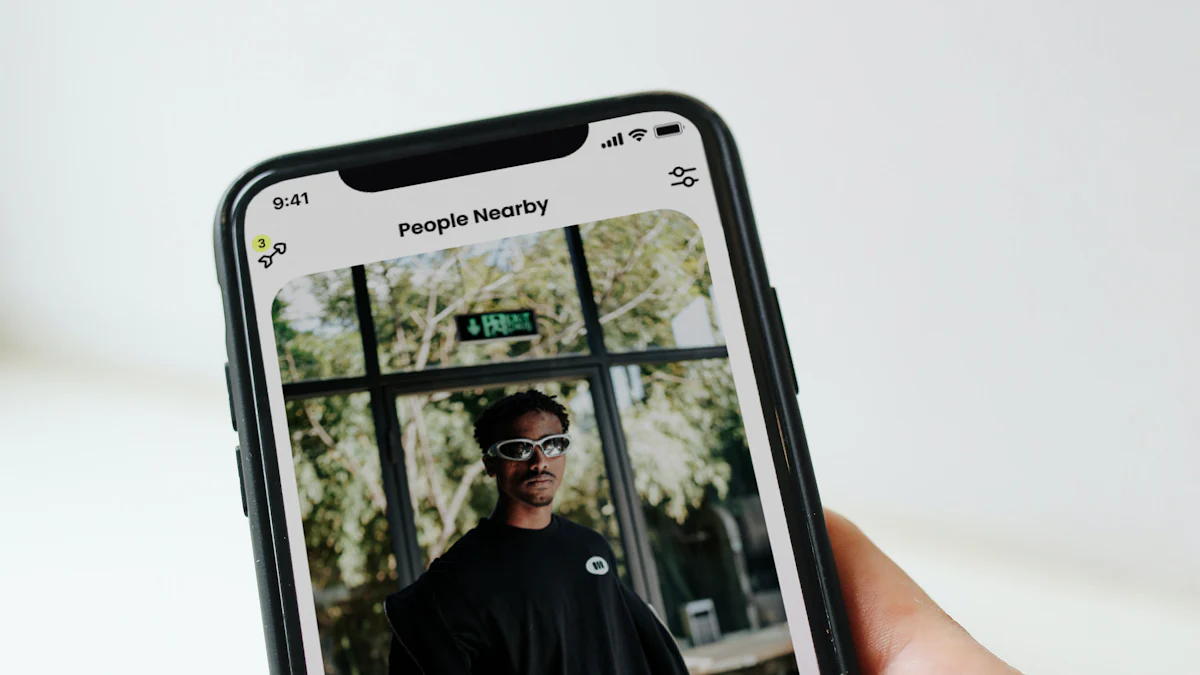

Pingback: Try these 29 first date ideas for long-distance relationships to spark connection, build trust, and make your first date feel special from any distance.
Pingback: Mastering the Stages of Dating Relationships: Essential Steps for 2025 - Date Night Club